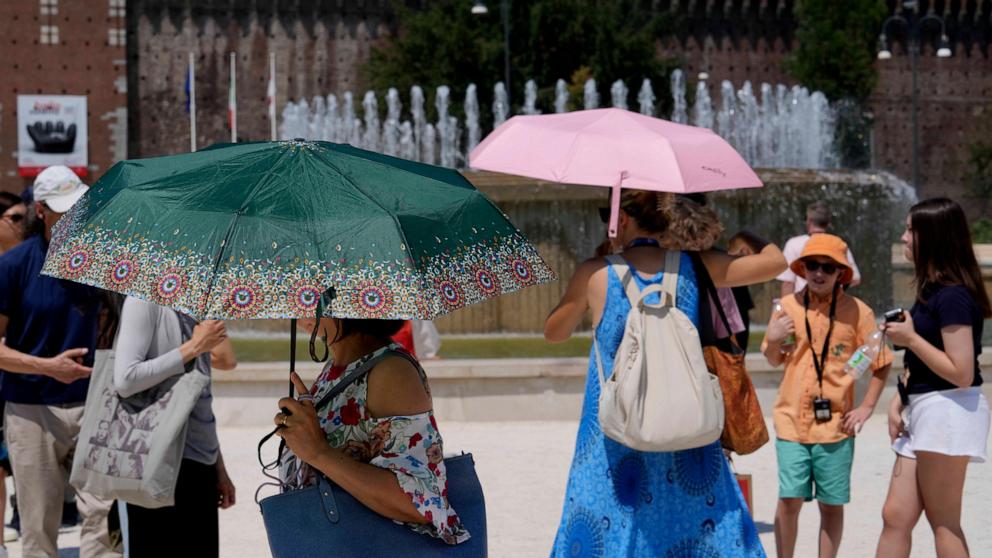ROME — Italy’s health ministry issued its harshest heat warnings for 12 cities on Tuesday as a hot wind from Africa swept across southern Europe and the Balkans, sending temperatures above 40 degrees Celsius (104 degrees Fahrenheit) with the worst expected to yet unfold.
Croatia is Adriatic SeaTemperatures reached nearly 30 degrees Celsius (86 degrees Fahrenheit) in the southern walled city of Dubrovnik, the country’s most popular tourist destination. In Serbia, the state-run power company reported record consumption from air conditioning on Tuesday.
Local authorities in several cities in southern Europe and the Balkans have taken steps to look after people, especially the elderly, as civil defense forces respond to evacuation requests. Water drop aircraft such as Canadair To extinguish wildfires that raged in southern Italy and North Macedonia.
“It’s hot as hell,” said Carmen Diaz, a tourist from Madrid, who was trying to cool down with a fan during lunch in Rome. “The fan helps a little, but it’s really hot.”
In Greece, local governments opened air-conditioned spaces to the public, but certain outdoor work, including manual labor, deliveries and construction, was banned during the hottest hours, when temperatures reached 40 degrees Celsius.
Temperatures are expected to reach 42°C in several countries on Wednesday and Thursday, and the Spanish National Meteorological Service said temperatures could reach 44°C in the southern Guadalquivir river basin over the next few days.
To beat the heat, Rome’s zoo plans to give its animals a popsicle respite later this week when temperatures are expected to exceed 38 degrees Celsius.
There was no such cold treat in store for those attending Coldplay’s concert in the Eternal City this week.
“It feels like being in an oven with a hairdryer on you,” said Patrizia Valerio, who had just arrived in Rome from Varese for the band’s final show on Tuesday night.
Concert companion Mattia Rossi was more philosophical, pointing out that the freak storms that hit Italy earlier this summer were evidence that climate change was wreaking havoc on the southern Mediterranean weather system.
“In my opinion, these are all signs that the planet is suffering,” Rossi said.
In Albania, where temperatures were expected to reach 42 degrees Celsius, a 72-year-old man was found dead on a farm in Memariaj, 200 kilometers south of the capital Tirana. The cause of death is believed to be heatstroke, local portal Panorama reported. Health authorities did not immediately confirm this.
In the city of Tirana, streets and cafes appeared largely deserted, with only a few people holding umbrellas for shade.High temperatures and strong winds have stoked wildfires that have spread from south to north in recent weeks.
Despite a relatively cool temperature of 34 degrees, Istanbul city authorities issued a heatstroke warning on Tuesday, advising residents, especially the elderly, pregnant women, children and those with health problems, to avoid going outside between 10 am and 4 pm. The advisory said temperatures in Istanbul were expected to remain 3 to 6 degrees above the seasonal average until July 28, and residents were advised to drink plenty of fluids and opt for light or cotton clothing.
“It’s windy here a lot, it’s like a natural air conditioner, so I always come here to cool off,” said Sami Gunaydin, a 62-year-old pensioner who was swimming in the Bosphorus on Tuesday. “God help those who don’t have air conditioning.”
North Macedonia has been hit by its second heatwave this month, with temperatures soaring to 42 degrees Celsius. Around 200 wildfires have raged across the country since the start of the month, injuring one firefighter so far, and the government has declared a month-long state of emergency.
It was the second week that temperatures hovered around 40C in Serbia, Croatia and Bosnia, with Mostar in Bosnia recording that high for the sixth consecutive day. Meteorologists expect the heatwave to peak on Tuesday before gradually easing over the weekend.
Romania and neighbouring Moldova were also hit by severe heatwaves last week, with temperatures in their capitals Bucharest and Chisinau reaching above 40C this week.
In Italy, the civil defense agency reported receiving 18 requests for help on Monday to put out wildfires raging in several parts of the south.
The health ministry has put 12 cities under a red heat alert, the highest level, from Trieste in the north to Rome in the centre, where everyone, not just the elderly and young children, is urged to stay indoors during the hottest parts of the day and to avoid strenuous outdoor exercise and heavy meals.
The Health Ministry announced that Palermo in Sicily is set to join the list of red alert cities on Wednesday.
Much of Greece is also experiencing a heatwave that will continue into the weekend, with temperatures expected to reach 42°C in some areas. The heatwave is expected to peak on Wednesday and Thursday, when temperatures could rise to 43°C, especially in central, western and northern parts of Greece.
The intense heatwave that has hit southern Europe has so far spared Paris. Host the Olympics Later this month. Temperatures were relatively low at 22°C on Tuesday but were expected to rise later in the week before dropping again after the weekend.
___
Elena Becatoros in Athens, Lazar Semini in Tirana, Albania, and Joseph Wilson in Barcelona, Spain, contributed to this report.
____
See more AP climate coverage at: https://apnews.com/hub/climate-and-environment


